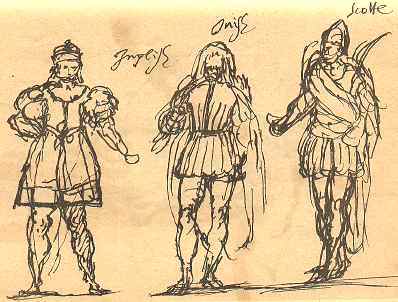More advice to the players
In a famous phrase, Hamlet describes what he sees as the ultimate aim of acting:
Be not too tame neither, but let your own discretion be your tutor. Suit the action to the word, the word to the action, with this special observance, that you o'erstep not the modesty of nature. For anything so o'erdone is from the purpose of playing, whose end, both at the first and now, was and is, to hold, as 'twere, the mirror up to nature. . .
And he attacks the overacting of some of the players he has seen:
O, there be players that I have seen play, and heard others praise, and that highly (not to speak it profanely), that neither having th'accent of Christians, nor the gait of Christian, pagan, nor man, have so strutted and bellowed that I have thought some of Nature's journeymen* had made men, and not made them well, they imitated humanity so abominably.
(Hamlet, 3. 2. 1-35)
Did Shakespeare agree with Hamlet?*
Footnotes
-
What does he mean?
- Nature's journeymen
- Hired assistants to Nature, not Nature herself.
-
Did Shakespeare agree with Hamlet?
Well, perhaps yes, and perhaps no.
The play-within-the-play in A Midsummer Night's Dream is a riotous parody of inflated acting: so in this he is in agreement with Hamlet.
But Hamlet's taste in literature is also satirized by Shakespeare: Hamlet has memorized part of a particularly blusterous, pedantic speech on a classical theme (2. 2. 457-505, quoted elsewhere), and his letter to Ophelia is not exactly a model of good style (2. 2. 109-24). Hamlet is a university man, and Shakespeare was himself satirized in a university play at about the time Hamlet was produced.
